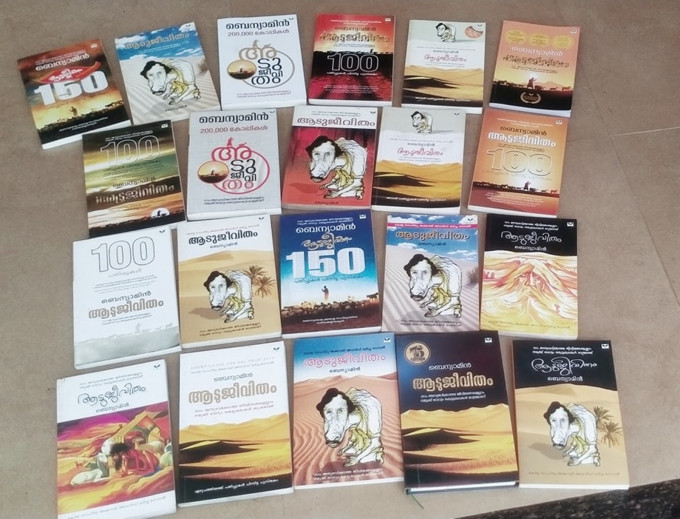At the audio launch of director Blessy’s much-awaited survival drama Aadujeevitham (The Goat Life), starring Prithviraj Sukumaran in the lead role, National Award-winning director Jayaraj observed that Aadujeevitham (the novel on which the movie is based) “must be the most read work, after Changampuzha Krishna Pillai’s Ramanan and MT Vasudevan Nair’s Randamoozham, in Malayalam literature’s history.”
On the occasion, the postmodern novel’s 251st edition was also unveiled, in the presence of its author Benyamin. Originally published in 2008, Aadujeevitham (Goat Days) stands as one of the best-selling works in Malayalam literature. Nonetheless, since its debut, the world has undergone significant changes and we even survived a global pandemic. As its film adaptation gears up for release on March 28, it prompts these questions: Is Aadujeevitham’s story still relevant? Are its themes and style still fresh? Can the narrative still connect with audiences as deeply as it did 16 years ago? Will Blessy and Prithviraj’s The Goat Life be able to do justice to the essence of Goat Days? Hmm… These questions necessitate a closer exploration of Najeeb’s world and his Aadujeevitham; yes, the novel itself.

While the book’s title may seem fantastical to some, suggesting fiction or fantasy, Aadujeevitham actually recounts the real-life experiences of a man, Najeeb Muhammad, hailing from the village of Arattupuzha in Alappuzha district of Kerala, as he endured a harrowing existence akin to that of goats in a Saudi Arabian desert for three years, four months and nine days starting April 4, 1992.
The novel begins with Najeeb and Hameed waiting at Al Batha police station in Riyadh, Saudi Arabia, to surrender themselves and be sent to prison. ‘Luckily’, they’re soon transferred to Sumeshi Jail. Through a first-person narrative, readers get to directly experience Najeeb’s emotions from the start and soon realise he’s surprisingly content in prison, prompting questions about his past. However, once we learn that Najeeb left his homeland for the Persian Gulf states to support his family but ended up working as a slave/goatherd in a desert for over three years instead, his emotion that prison feels like paradise becomes understandable.
 The world didn’t know us; we didn’t know it either. That was prison.
NajeebAadujeevitham
The world didn’t know us; we didn’t know it either. That was prison.
NajeebAadujeevitham
One of the major attractions of Aadujeevitham is how Benyamin delves into Najeeb’s innermost feelings, guiding readers through his soul. Through maximalism, by meticulously and extensively detailing Najeeb’s emotions and the visuals he encounters, the novel immerses readers in Najeeb’s story, making us feel like silent spectators or mere spectral presences.
Neatly divided into four parts — prison, desert, escape and refuge — based on the four most important phases in Najeeb’s life, Aadujeevitham portrays not just Najeeb’s journey but also themes of struggle, helplessness, hope, resilience and tenacity he experiences in a detailed and hard-hitting manner.
Watch Aadujeevitham trailer here:
In the beginning, Najeeb also recounts memories of his humble life with his mother and his wife Sainu — a family with modest dreams. An innocent man and a devout believer in Allah, Najeeb interprets the events in his life as part of the divine plan. Thus, when offered the opportunity to migrate to the Gulf, he accepts it without hesitation, seeing it as a blessing, and sets off, along with a fellow job recipient named Hakeem, to Saudi Arabia.
But, what awaited them there was beyond nightmares. While waiting for their recruiters at the Riyadh airport, Najeeb and Hakeem are approached by an Arab who seizes their passports and instructs them to board his old vehicle. Though he appeared nothing like the Arabs they had heard of in stories, the two abide thinking he is their Arbab (boss/master). [Only in the end does Najeeb realise that he and Hakeem were kidnapped by this man and that their actual recruiter was someone else.] The man takes them to the middle of a desert and sends them to different masaras (where sheep and goats are raised). Initially hopeful, Najeeb’s optimism wanes as hunger sets in, highlighting how hunger and thirst change people instantaneously.
Even then, Najeeb is unsure of what his life is going to be. Shortly after, he encounters another man at the masara, who also tends to goats there. Upon observing the man, whom Najeeb labels “scary figure”, he realises the fate that awaits him. “The scary figure had matted hair like that of a savage who had been living in a forest for years. His beard touched his belly. He had on the dirtiest of Arab clothes. Also, a horrible stink that could drive anyone away,” Najeeb says, as the moment symbolises him meeting his own future self.
Aadujeevitham also highlights the struggles faced by the underprivileged, who often find themselves resigned to their circumstances and forced to submit to those in power, particularly those who control access to food. Despite enduring numerous hardships, Najeeb consistently addresses his oppressor as “my Arbab,” showing his servile nature. While the story centres on Najeeb’s challenges, it also challenges the romanticised depiction of deserts and lives there, emphasising that only the privileged, writers or tourists can find beauty in such landscapes, and not the ones whose first lesson there was that “it’s a crime to wash the butt after pooping”.
 Actor Prithviraj Sukumaran as Najeeb in Blessy’s Aadujeevitham – The Goat Life. (Images: Prithviraj Sukumaran/Facebook)
Actor Prithviraj Sukumaran as Najeeb in Blessy’s Aadujeevitham – The Goat Life. (Images: Prithviraj Sukumaran/Facebook)
With the realisation that this existence has become his life, Najeeb begins to inadvertently forget memories of his homeland, only for them to hit back forcefully, triggering intense pain akin to the first time he felt water touching his body, months later, when it rained. Despite all these, Najeeb remains resilient, expressing his readiness to work tirelessly, underscoring human beings’ efforts to survive, though all he gets to eat is Khubus sans any side dishes.
Once the senior goatherd “flees” and the Arbab’s assaults and exploitation worsen, Najeeb is utterly devastated, finding solace only in the company of the animals, whom he even provides names, to have some ‘friends’. During this time, a goat gives birth to a kid, reminding Najeeb that his wife was pregnant when he left. Seeing the birth of a male goat as a good omen, he chooses to believe that his wife too has given birth to a son and names the kid after the name he had planned for his own child – Nabeel. In this expertly crafted part, Benyamin vividly portrays Najeeb’s despair and powerlessness. This feeling intensifies when his Arbab, portrayed as an ominously omniscient figure, an evil God may be, forces Najeeb to assist in castrating the goats. “The day Nabeel lost his manliness, I too lost mine,” Najeeb remarks, conveying a sense of losing faith in life and seeing himself as the last man on earth, trapped in a sinister world, or “an alien planet inhabited by some goats, my Arbab and me”.
The manner in which Najeeb talks about his feelings and surroundings as if those encompass the entire world, not only underscores the inherent tendency of human beings to prioritise themselves and their own experiences but also, serves to illustrate the profound solitude of the desert where he, at times, “tried to find some shade in the shadow that fell from my staff”.
The moments that Benyamin has chosen to emphasise the pathetic condition in which Najeeb lives are significant. With no watch, Najeeb resorts to gauging time through the goats’ behaviour and his chores, underscoring how mechanical his life has become. Gradually, he begins to see himself as merely another goat, devoid of emotions or thoughts, driven solely by survival instinct. Another poignant indication of the passage of time occurs when Najeeb realises he can no longer detect the initial stench of the masara, suggesting he has assimilated into that odour after not bathing or cleaning himself for long.
 The covers of the different editions of writer Benyamin’s novel Aadujeevitham – Goat Days. (Images: Benyamin/Facebook)
The covers of the different editions of writer Benyamin’s novel Aadujeevitham – Goat Days. (Images: Benyamin/Facebook)
Despite his efforts to suppress his past and adjust to his new circumstances, Najeeb couldn’t escape memories of home — the power of memories, which both sustain and haunt us. Despite knowing he could never send it, he writes a letter to Sainu. “The truth was not in that letter, but in my tears — the truth that nobody read,” he says.
Yet, Najeeb remains steadfast in his decision not to flee, despite attempting to do so on a couple of occasions. “If I ran away into an unfamiliar desert, I might lose even that. Then what would be the meaning of all that I had endured so far?”
In a brilliantly crafted passage, Aadujeevitham also addresses Najeeb’s physical desires authentically, depicting a moment when he finds solace in the warmth of a female goat.
 My experience taught me that no matter how severe our pain or how harsh the difficulties we face, we come to terms with our miseries in the course of time.
NajeebAadujeevitham
My experience taught me that no matter how severe our pain or how harsh the difficulties we face, we come to terms with our miseries in the course of time.
NajeebAadujeevitham
Fortunately, Najeeb receives an opportunity to flee, for which too he expresses gratitude to Allah, as Hakeem and his new cohabitant Ibrahim Khadiri devise a plan. Benyamin skillfully reveals that Najeeb never truly abandoned his desire to return home, despite his earlier monologues suggesting otherwise. These monologues were his attempts to suppress memories to avoid succumbing to desperation and guilt. Before departing, Najeeb bids a heartfelt farewell to all the animals, showing his bond with them.
With scrupulous attention to detail, Aadujeevitham, through the narrator, vividly portrays the trio’s desert experiences, as they attempt to escape their hardships without water, food, or a sense of direction. However, they encounter unforeseen obstacles in the desert too. Despite this, Najeeb places his trust in his “guide and saviour” Khadiri as they press on, though the oasis seems distant.
 If you are unfamiliar with deserts, you may wonder if this desert was a desert at all. Swarming with living beings it was almost a forest. Snakes, centipedes, lizards, spiders, butterflies, vultures, wolves, rabbits, mongooses and so many other creatures like them. Each with their own paths, their own territories, their own laws — man, his law and his life had no significance here.
NajeebAadujeevitham
If you are unfamiliar with deserts, you may wonder if this desert was a desert at all. Swarming with living beings it was almost a forest. Snakes, centipedes, lizards, spiders, butterflies, vultures, wolves, rabbits, mongooses and so many other creatures like them. Each with their own paths, their own territories, their own laws — man, his law and his life had no significance here.
NajeebAadujeevitham
Through thorough detailing, without overwhelming the narrative, and using straightforward language, Aadujeevitham emerges as one of Malayalam’s most compelling survival dramas. Therefore, expectations are high for its cinematic adaptation. Thanks to Benyamin’s exceptional storytelling and the timeless nature of Najeeb’s experiences, Aadujeevitham will remain relevant for years to come. At the same time, in spite of the challenging context where both the perpetrator and the victim are Muslims, Benyamin skillfully navigated the story without portraying any Islamophobic elements, which is commendable.
“More than just an entertainer, cinema should spark conversations among us as an art form and be remembered even after years. Cinema, over any other art form, touches our life in its own beautiful way,” Blessy said during a recent chat with Film Companion.
 I didn’t sugarcoat Najeeb’s story or fluff it up to please the reader. Even without that, Najeeb’s story deserves to be read. This is not just Najeeb’s story, it is real life. A goat’s life.
BenyaminAuthor, Aadujeevitham
I didn’t sugarcoat Najeeb’s story or fluff it up to please the reader. Even without that, Najeeb’s story deserves to be read. This is not just Najeeb’s story, it is real life. A goat’s life.
BenyaminAuthor, Aadujeevitham
However, the main challenge for Blessy lies in balancing the use of monologues, as the entire novel unfolds from Najeeb’s perspective and heavily relies on his inner thoughts. The film will need to find visual alternatives to prevent excessive monologuing, especially given the limited number of characters. The manner in which Prithviraj has portrayed the lead character will be of utmost significance, again since the novel and the movie mostly only revolves around Najeeb.
Meanwhile, smell serves as one of the most potent descriptive tools throughout Benyamin’s Aadujeevitham. However, as cinemas haven’t advanced to fully capture this sense, the filmmaker would have had to rely on other means to immerse viewers in the story’s world. Nevertheless, given Blessy’s reputation as a master storyteller, audiences expect a remarkable cinematic experience that honours the timeless novel.
Disclaimer: The copyright of this article belongs to the original author. Reposting this article is solely for the purpose of information dissemination and does not constitute any investment advice. If there is any infringement, please contact us immediately. We will make corrections or deletions as necessary. Thank you.







